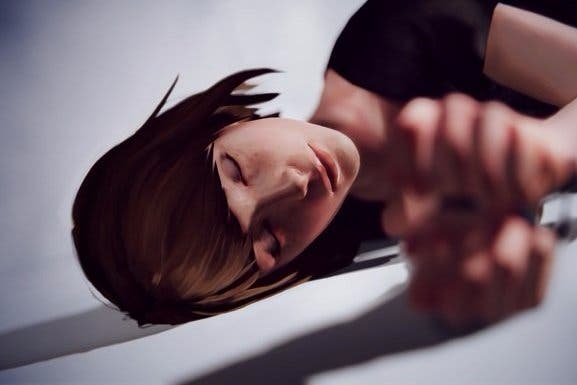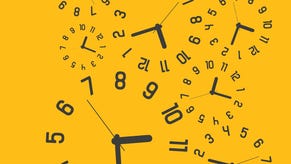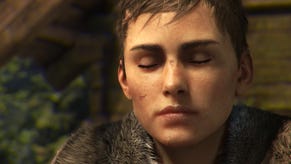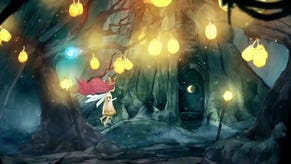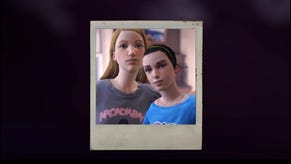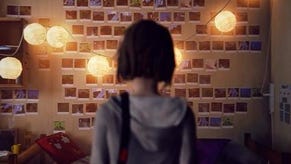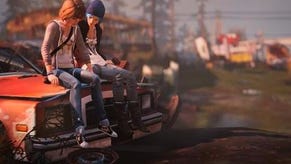Life is Strange team talk fan theories, that season finale and more
So, that old lady behind the diner...
Life is Strange concluded almost six months ago but Dontnod's episodic series still sparks discussion in the Eurogamer office.
So we jumped at the chance to meet the Dontnod team again while they were in London for the video game BAFTAs - where Life is Strange scooped the Best Story prize.
Aoife and I - both present for the chat - have interviewed Dontnod several times in the past, although this interview was made all the more interesting as it was the first time Life is Strange writer Jean-Luc Cano has spoken about the game.
Joining him were co-game directors Michel Koch and Raoul Barbet, along with producer Luc Baghadoust for a lively chat about the game's story, characters - and that ending.
Tom: Hey guys - so I remember speaking with you at Rezzed last year, back when the game was still coming out. It was still early on...
MK: We'd just released Episode 2, and it was doing... well? There were good reviews for the first couple of episodes and we were starting to get a bit of a community. Each episode we got more and more players as people heard through word of mouth about the game. Even now... it's been five months since the last episode but we are still getting a lot of emails, people are still talking about it.
RB: This time last year we still had so much to do - Episodes 3, 4 and 5 - and we were starting to realise how people were now waiting for each episode. It was totally different to have this kind of good pressure. We knew what was going to happen in each episode and hoped people would enjoy the rest... and I remember when Episode 2 came out, some people were saying - how are you going to top this? And we knew how Episode 3 ended... [laughs]
Tom: Yep - "just wait until you can go inside pictures!" Jean-Luc, as this is your first interview I wanted to ask about writing the game. It's a game about teenagers and the main character is a girl - neither of which you are. How did you approach that?
JL: So, Life is Strange began with the idea of using the time rewind mechanic from Remember Me. The first idea I had was of a girl using the power, having a female character. Then we thought it'd be great to have another character - another female character - to guide the player towards their goals. But we didn't want the usual video game mechanics of having missions and all that. So we created Max and Chloe and their relationship - which for me is the central part of Life is Strange.
LB: Jean-Luc has a great way of writing characters, writing a story. And he focused on writing those characters first and the story arc rather than simply filling in dialogue for a video game - he talked about that with Michel but it was more about making the characters real and believable. And, as you say, we didn't want to be the 30-year-old French guys making a game pretending to be teenage girls. We did a lot of research, obviously, but a lot more of that work was done by Christian [Divine, who penned Life is Strange's script], as he is an American. We didn't want to write in French and then have stuff lost in translation. So instead Jean-Luc worked with Christian so the dialogue fitted well with his story.
JL: Christian brought the dialogue but he also brought a real reality to the characters. He's American, he went to college there. For us, you know, we have television versions of this but for Christian - it was his real life.
Aoife: You also touch on plenty of female-centric issues - how did you make sure you handled those issues sensitively without risking criticism that you hadn't fully understood them?
JL: It's just about trying to tell the truth. You don't have to be a woman to write good female characters.
LB: That and we made sure we did research the topics we included. With bullying, for example, we visited forums where it was being discussed. And of course, bullying happens in France too! But we really wanted to make sure we were portraying it accurately for teenagers currently.
JL: The job of a writer is to be curious. I know Christian spends a lot of time talking to people, even of heading out to write in coffee shops where he is surrounded by people talking, so he has an idea of the kind of people he is writing.
MK: It is getting easier, as everyone has the internet - we saw a video where someone was showing off their college room and it was just like the ones in the game. The issue of the surveillance cameras in the first episode is a real issue, we spotted discussion around a case in real life.
Aoife: What was your favourite character to write?
JL: So, Kate [Marsh] - I initially didn't like her very much! Her personality is very different to me, but as she became more of a sympathetic character, as we made her become more human, she is now one of the characters I find the most memorable.
Aoife: And with Warren, did you guys know how polarising he would be? I think he's a great character because everyone has such strong opinions on him.
JL: [Laughs] Maybe!
MK: What's your opinion on him?
Aoife: I... think he's a dickhead. [All laughs] He's entitled, I think he's got an agenda. But people I know have said they see a little of him in themselves - at least, when they were his age. So maybe there is hope for him. I think he's really interesting.
Tom: I have to agree. What do you think people expect now from Life is Strange? Is there something that defines the franchise now - something people might expect if there ever was another season? Or could it be completely different?
MK: When we look at the community, what we think resonates with people is the game's characters and their relationships. It's about having themes and characters who feel familiar in some way, and making them feel like people that players can empathise with.
Spoiler warning: ending discussion follows.
Tom: Let's discuss the ending now. You've said in the past that the ending was planned from the start - that it was always going to be that choice. I wanted to ask why you decided to make that choice solely based on the player's own gut feeling. There are no other mechanics in play, no previous choices change anything - the decision to either save Chloe or Arcadia Bay is dependent entirely on the player's feelings for both:
JL: We wanted it to be all about your own feelings - for there to be no right or wrong decision. More than that, this choice is really a metaphor for growing older. The narrative arc of Max begins in episode one where she really is a teenager and slowly she changes to become more of an adult.
MK: It's about making a sacrifice and accepting you cannot change your mind.
JL: The whole game is about how in real life you do make sacrifices and cannot go back and make the other option. When you are a child you think you can have a bit of this one, a bit of this one. When you are an adult you sometimes have to make difficult decisions.
Tom: So, my personal choice was to save Chloe because I thought at least some people in the town would survive...
JL: That's how you sleep at night?!
Tom: Yeah! It was a huge storm, if people weren't smart enough to get out... Anyway - I'm interested to hear what you chose.
LB: Personally I saved Chloe. I absolutely love the other ending but I've watched it so much and it's still so hard to watch. I remember the camera artist in front of me working on it, working all day to adjust the expressions... I don't know what I'd have done in real life but for me in the game, that's what I had to do.
MK: It's hard, even when you know the game. I would go with saving the town...
RB: I would sacrifice both! [laughs] No, I would have to go with saving the town. And I love Foals, the band whose music plays when you do. So I'd know that was coming at least. But honestly, the editing and framing of the scene that follows is one of the most memorable things about the game.
JL: And for me, as much as I love Chloe, I'd feel like I was being selfish sacrificing 10,000 people for the sake of the woman I love.
LB: I'd sacrifice 10,000 people for my wife! [All laughs]
Tom: Yeah, I personally played Max like she was always trying to help people, act benevolently. And she never asked for those powers.
Aoife: So saving Chloe at the end is your reward? [laughs]
MK: We made sure we had the nightmare scene right at the end to help players make this decision. We wanted to remind people of Chloe and the experiences you've had throughout the series in preparation for the final choice. We've also seen how people's final choice is often reflected by how they responded to the characters throughout. But it's still fairly close to a 50-50 choice when you look at the statistics.
Tom: We have completely run out of time, so just one final question. Was Samuel crazy and who was the old woman behind the diner and did Sean Prescott know about the storm?
JL: Maybe, maybe and maybe. For sure. [All laugh]
RB: Samuel was a squirrel in another life, so who knows.
MK: I think the old lady was mostly a homeless lady who had things she wanted to talk about with Max.
Tom: There were a lot of theories about her...
MK: It was really interesting to see those ones which were very fantasy-like - that she was a time-traveller, that she was Max from the future. It was interesting because part of the message of Life is Strange is that life can be hard. For instance, in real life when someone has been reported missing for more than six months there's a very real chance this person is dead. So the idea that some people grasped some of those fantasy theories that life was not as harsh as it could be, that life is not that bad...
Tom: ... it gives meaning to characters like the old lady when really it was that she was just a homeless elderly lady. Yep. Which is pretty sad.
MK: I think that some players knew Rachel was likely to be dead, but to see it - to actually be shown it - is another matter.
Tom: Honestly, I always thought she'd feature. Either through time travel or something. It would be too dark otherwise. So it was a complete shock.
RB: We have heard several people say that. It was a shock to accept that, of course she's dead.
Tom: Exactly. Anyway! On that cheerful note, thank you once again for your time - it's been fascinating. And, hopefully, we'll see you again.
